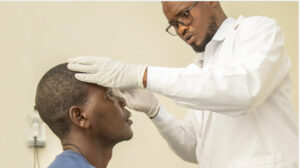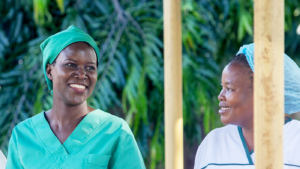by Adnan Youhana
First published October 2024 by Sightsavers
Sightsavers’ Adnan Youhana shares how eliminating trachoma in Pakistan was a true team effort, involving eye surgeons, radio hosts and Lady Health Workers.
Earlier this month, we heard the fantastic news that Pakistan has eliminated the eye disease trachoma as a public health problem.
For me and my colleagues at Sightsavers, it is satisfying to see that our relentless efforts have finally paid off. The disease, which can cause pain and permanent blindness, has been defeated across the country.
But we weren’t celebrating on our own behalf. From the outset, this process has involved a wide and varied group of partners.
We have worked closely with Pakistan’s Ministry of National Health Services, Regulations and Coordination, and with other international non-profit organisations. However, there are other groups that deserve a mention too.
Training Lady Health Workers to identify trachoma
Pakistan’s health system has a unique asset – its legion of female health care professionals, known as Lady Health Workers.
Around 100,000 female health workers are currently operating in rural regions and disadvantaged urban areas across the country. They are often the first level of health care for their local community, where they are involved in services such as immunisation, pre- and post-natal care, and family planning.
They also played a key role in the fight against trachoma. Over the past few years, Sightsavers has helped to train more than 1,700 Lady Health Workers and their supervisors to identify people with symptoms of the disease.
In Pakistan, social barriers mean that some women cannot be visited by male health care workers, making the role of the Lady Health Workers even more essential. They were able to gain access to households, examine women and children, and refer them for treatment when necessary.
Alongside this, we worked with Pakistan’s health department to train eight surgeons to operate on patients with trachomatous trichiasis. This is the advanced form of trachoma, where a person’s eyelids have begun to turn inwards so that their eyelashes scrape painfully against the surface of the eye.
The surgeons we trained were able to carry out operations to correct this painful condition for 127 patients, including 88 women.

Using the airwaves to spread our message
Once we identified people with advanced trachoma, we needed to persuade them to undergo surgery for the condition. Although trachoma operations can last as little as 15 minutes, some people have reservations about stepping into the operating theatre.
To tackle this issue, we turned to Pakistan’s media industry, and arranged for trachoma surgeons to appear on radio programmes. This allowed us to spread the message that trachoma operations were safe, effective and could help to prevent sight loss. We were also able to educate listeners on the best ways to avoid contracting the eye disease.
Sightsavers and our partners also worked with community and religious leaders to raise awareness about trachoma and how it can be prevented. This helped to build trust and acceptance within local communities.
While these activities were ongoing, groups of volunteers distributed antibiotics that could protect the population from contracting trachoma. People in towns and villages across Pakistan also played their part by building latrines to improve hygiene and prevent the disease from spreading.

Eliminating trachoma across the Commonwealth
Lastly, we should acknowledge the role of international donors, including the UK’s Foreign, Commonwealth and Development Office (FCDO) and the Australian NGO Cooperation Program (ANCP), whose funding supported Pakistan’s efforts to defeat trachoma.
This international partnership has proven to be a winning formula. I’m proud that we are part of a growing list of countries that have eliminated the disease as a public health problem – which also includes our fellow Commonwealth nations Ghana, The Gambia and Malawi.
Sightsavers is currently working with the governments of many other countries, including Kenya, Nigeria and Tanzania, to banish trachoma.
When HRH Sophie, Duchess of Edinburgh, visited our trachoma programme in Tanzania in September, she spoke of an ambition that this infectious disease would be eliminated across the Commonwealth by 2030. This is an ambition that Sightsavers shares wholeheartedly.
About the Author

Adnan Youhana is Sightsavers’ senior project officer. He is based in Pakistan.
.
Watch this video to learn more about Sightsavers’ work treating trachoma:
Related Articles

Alinafe Cuts the Queues: One Man’s Mission to Make a Difference in Malawi
Learn about one man’s mission to make a difference in Malawi by training as an eye health specialist. From Sightsavers.

Sightsavers from the Field: “Everyone Deserves Quality Eye Care Services”
In Uganda, an inclusive eye health programme has helped to protect people’s vision and build a sustainable eye care system for everyone.

Sightsavers from the Field: “I know their future is going to be bright”
Cataracts are the world’s leading cause of blindness. On World Sight Day, learn what Sightsavers is doing to protect the sight of children with cataracts in Zambia.
